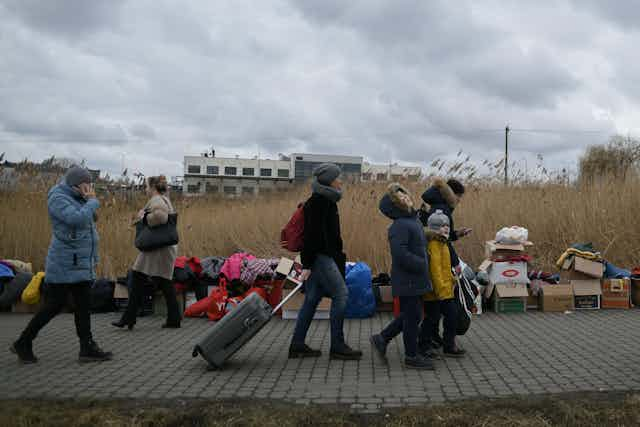Of the 8 million Ukrainian refugees registered in Europe, some 1.6 million are now in Poland. They have joined another 1.5-2 million who arrived after the Russian invasion of Crimea in 2014. Ukraine’s two main languages, Ukrainian and Russian, are now heard everywhere in Poland.
Symbols of Polish support for Ukraine and Ukrainians remain visible in the streets, such as flags and signs in shop windows. But despite the many signs of public sympathy, and the country’s political support for Ukraine, public opinion about the future role of Ukrainians in Poland has shifted in the past 12 months.
To find out more about social attitudes, we surveyed more than 2,000 young Poles, aged 16-34, in March 2022 and again in May-June 2023. Our analysis found that between 2022 and 2023, increasing numbers of young Poles – now 52%, up from 42% a year ago – believe that refugees should be offered temporary status, with the assumption that they return to Ukraine as soon as it becomes safely possible.

Around 56% of young Polish women (16-34) wish for a return of Ukrainian refugees to their home country as soon as the war is over, compared with 49% of young Polish men.
The overall percentage of young Poles who want Ukrainian refugees to be offered the opportunity to integrate into Poland for the long term has remained at a stable 25%, with around 31% of men and 20% of women continuing to see this option as more desirable.
This gender difference seems to be driven mostly by men’s lower involvement in everyday challenges of Polish life, such as limited spaces in state-sponsored nurseries or access to healthcare – something that was clear from the focus groups we conducted in 2022.
Different political and social views result in different attitudes to what should be offered to Ukrainians. Those young people who self-identify as Catholic in our survey are 10% more likely than others to desire their return to Ukraine when this becomes possible. This is also true of those who support the far-right Konfederacja, a party that has opposed the Polish response to the war in Ukraine, who are 13% more likely to express that view than others.
There has been a fundamental shift when it comes to the stance that young Poles think their government should adopt in the war in Ukraine. In 2022, an overwhelming majority of 83% argued that the government should support Ukraine – but this number has changed drastically.
Now, 65% of respondents back continuous support for Ukraine, whereas the remaining 34% wish for Poland to stay neutral. Clearly, more than one and a half years into the current phase of the conflict and amid fears of other countries being pulled into the war, young people have become more cautious.

In particular, the oldest people in our sample of young Poles (those aged 25-34) express the strongest wish for political neutrality, as do those from cities with fewer than 500,000 inhabitants and young people who have not engaged in helping Ukrainians over the last 18 months.
Neutrality is also more likely to be desired by those who are politically less engaged – for example, mentioning in our survey that they do not intend to vote in the upcoming parliamentary elections.
This shift in attitude goes hand-in-hand with increased political support for Konfederacja. Since the beginning of the Russian invasion, the far-right political party has lobbied for Poland not to support Ukraine, while warning about the “Ukrainisation of Poland”.
Some of the slogans used during demonstrations, such as demands for the “denazification of Ukraine”, are very similar to those used in Russian propaganda. Poland’s parliamentary elections later this year will show whether support for the far-right has increased further.
Asked about the type of support that people consider appropriate for Ukraine, our most recent (2023) data shows that only 2% of young Poles want the national army to be involved in the Ukraine war. And while 60% support offering humanitarian aid, only 28% want Poland to offer weapons. Those supporting the far-right (roughly 20% of our respondents) are most likely to oppose the sending of weapons.
Rise of the far right
With an election this autumn and the profound socio-demographic shift caused by Ukrainian migration, which has turned Poland into a more multicultural country than at any time since 1945, the political discourse has become extremely polarised.
The governing Law and Justice party (PiS) is looking for potential coalition partners – and scapegoats (in the last presidential campaign, the Polish LGBTQ community was designated by PiS as the nation’s key enemy).
Until now, the governing party’s rhetoric has been mostly anti-German, and has tried to find ways to discredit pro-EU politician (and former president of the European Council) Donald Tusk, who currently leads the centrist Civic Platform party. The impending election campaign is likely to bring a new degree of conflict into Polish politics.

